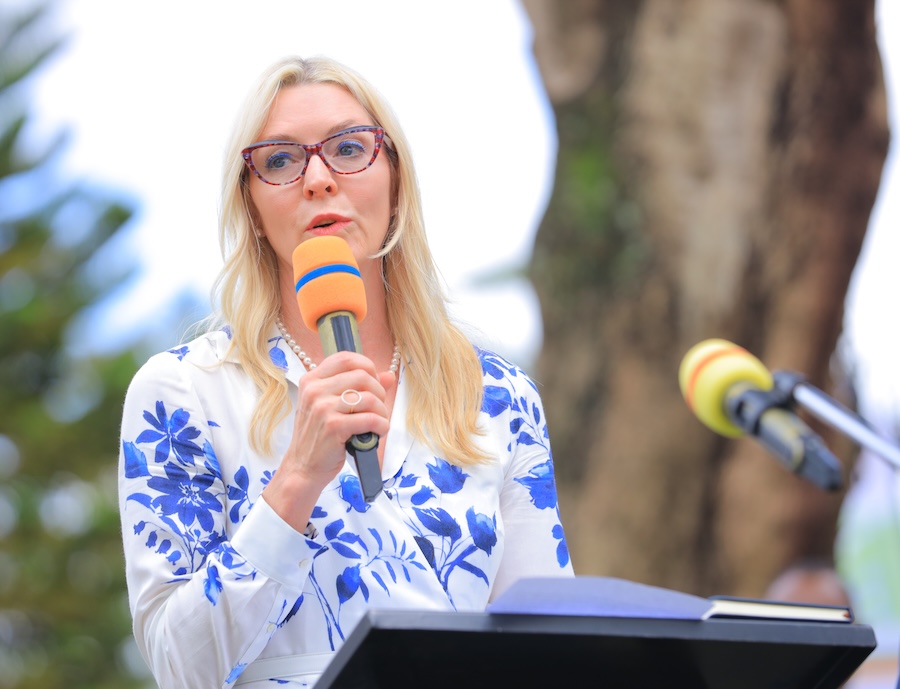NORTHAMPTON, MA / ACCESS Newswire / May 7, 2025 / By Catharine Grimes, President of the Bristol Myers Squibb Foundation
We are in an era of unprecedented medical innovation. Scientists are making remarkable progress to diagnose and treat diseases, bringing new hope to patients across the world. Unfortunately, these breakthroughs fail to reach everyone due to barriers to care.
The Bristol Myers Squibb Foundation (BMS Foundation), an independent charitable organization, is committed to changing that. Building on our legacy of expanding access to healthcare, we've launched a new strategic framework to strengthen sustainable health service delivery for regions of the world that are medically underserved and heavily burdened. We have zeroed in on four areas to meet critical needs: Adult Cancers; Pediatric Cancers and Blood Disorders; Excellence in Clinical Trials; and Neuropsychiatry.
As we strive to improve health outcomes, building local healthcare capacity is the foundation of our strategy. We do that by forging partnerships with community-based groups, public institutions, and other local stakeholders. Here is a snapshot of how the BMS Foundation is translating our strategy into lasting impact in each of our focus areas:
Accelerating Early Detection of Lung Cancer
Lung cancer is the leading cause of cancer death, but early detection can dramatically improve survival rates. The BMS Foundation's Multinational Lung Cancer Control Program (MLCCP) builds on over a decade of work in the U.S. to strengthen local healthcare system capacity and scale community-based screening.
The Quality Implementation of Lung Cancer Screening (QUILS) program through the University of Kentucky Markey Cancer Center and the University of Colorado Cancer Center is a testament to the power of this approach. QUILS empowers Kentucky healthcare providers to better evaluate high-risk patients and educates communities about the importance of early detection. In just ten years, QUILS has transformed Kentucky's lung cancer screening rate from among the lowest nationwide to the second highest, driving a remarkable 10% decline in late-stage diagnoses.
Guided by our success in Kentucky, we recently expanded the program into Mississippi and Nevada. By improving access to lung cancer screenings in these heavily burdened regions, we have an opportunity to transform health outcomes and save lives.
Boosting Local Capacity to Combat Pediatric Diseases
The second pillar of the BMS Foundation's strategy - addressing pediatric cancers and blood disorders - has roots in our decadeslong efforts to support children in sub-Saharan Africa. Alongside partners, we mobilized at the height of the HIV/AIDS epidemic to train tens of thousands of healthcare workers and improve health outcomes.
In 2016, these joint efforts evolved into a new program, Global HOPE, to address staggering mortality rates for pediatric cancer and blood disorders in the region. Since then, Texas Children's Hospital and Baylor College of Medicine Global Health, with our support, have trained more than 7,000 healthcare workers - including 35 of the first hematology-oncology specialists on the continent - and provided care to more than 26,000 children.
The next phase of our pediatric work in sub-Saharan Africa will combat another threat: sickle cell disease (SCD), which is responsible for over 500 daily child deaths in the region. Simple life-saving interventions can treat SCD, but access to care is virtually nonexistent in non-urban areas. Leveraging the local infrastructure we have helped build for over 25 years, our new initiative is equipping local health systems and integrating SCD interventions into local primary care systems.
Transforming the Clinical Trial Landscape to Improve Health Outcomes
Clinical trials are crucial in enabling new treatment options for patients. To ensure everyone can benefit from therapeutic breakthroughs and to avoid misdiagnosis and mistreatment, it is essential that patients enrolled in these trials be representative of the epidemiology of the disease being studied. However, that is too often not the case.
The BMS Foundation-established Robert A. Winn Excellence in Clinical Trials Award Program (Winn Awards) is working to address that discrepancy, training the next generation of clinical trialists in high quality clinical trials and community engagement. Through these efforts, the Winn Awards program is working to improve participation in clinical trials to drive better health outcomes for all communities.
Opening New Pathways for Critical Mental Health Services
The rate of Serious Mental Illness (SMI) in the U.S. is significantly higher in jail and prison than in the general population, with 44% of people in jail and 37% of incarcerated individuals living with mental illness. Almost half of Americans with SMI and co-occurring mental health and substance use disorders have had contact with the criminal justice system.
Mental health diversion programs are a promising alternative to direct patients away from the criminal justice system and toward community-based mental health services. There is tremendous opportunity to expand the capacity of diversion programs across the country - and that's exactly what the BMS Foundation's newly launched program area will help facilitate. We will be supporting innovative community-based programs that can open new pathways to care and deliver better health outcomes for people with SMI.
Expanding Access to Care to Improve Global Health
At the BMS Foundation, we believe a healthier world is attainable and achievable. But access to care remains unequal. We must create more sustainable systems of health service delivery to eliminate barriers to care.
As we embark on our next chapter, our evolved strategy is designed to transform how care is delivered for areas that are medically underserved and heavily burdened by disease. Driven by a commitment to create lasting impact in the communities we serve and bolstered by robust partnerships, we are determined to bridge gaps in care and drive positive health outcomes for people in need of support - today and for years to come.
To learn more, visit the Bristol Myers Squibb Foundation online.

Catharine Grimes, President of the Bristol Myers Squibb Foundation. Photos Courtesy of Texas Children's Hospital.
View additional multimedia and more ESG storytelling from Bristol-Myers Squibb Company on 3blmedia.com.
Contact Info:
Spokesperson: Bristol-Myers Squibb Company
Website: https://www.3blmedia.com/profiles/bristol-myers-squibb-company
Email: info@3blmedia.com
SOURCE: Bristol-Myers Squibb Company
View the original press release on ACCESS Newswire:
https://www.accessnewswire.com/newsroom/en/healthcare-and-pharmaceutical/improving-access-to-care-by-strengthening-local-health-system-capacit-1024706



